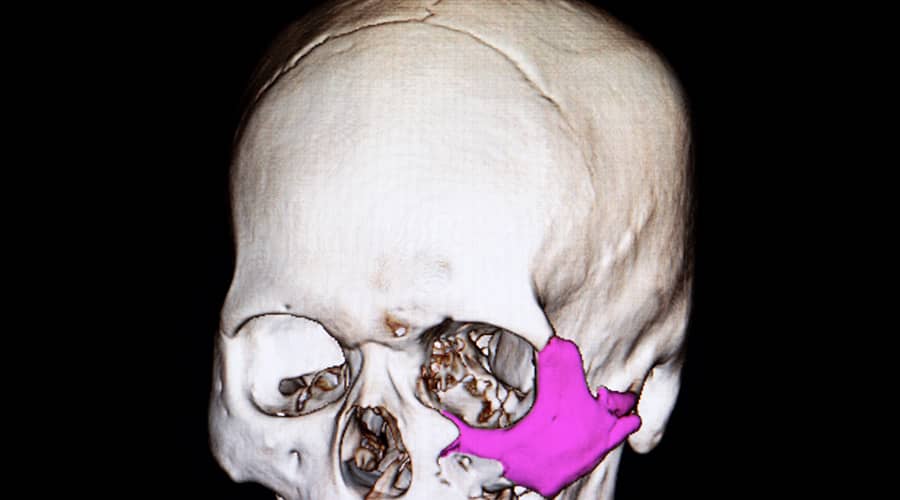
After an eye socket (orbit) fracture is repaired, please follow these home care instructions during the first week before you return for your first follow-up visit. Please call us immediately if you have questions regarding these instructions or concerns about your condition.
Consultation
It is recommended that you schedule a follow-up exam with an ophthalmologist as soon as you are discharged from the hospital. Although a hospital ophthalmologist may be present during your hospitalization, the presence of any additional injuries, where your home residence is, and what facility you are discharged to are all factors that contribute to when you will be discharged.
Swelling
It is normal to experience swelling of the eye tissues, peaking by the third day after surgery. You can minimize swelling by applying ice-cold compresses to the eye. You can also reduce swelling by keeping your head elevated after surgery. You should sleep with your head elevated on two pillows for at least three nights after surgery. Notify our office if you experience a sudden increase in swelling.
Pain
As with any surgery, some degree of pain is to be expected. You will be provided with a prescription for pain medication. Take this medication every 3-4 hours as needed for pain. If you experience a sudden increase in pain, you must contact our office immediately. To avoid stomach upset, take the pain medication with a small snack and a glass of water. While taking pain medication, do not operate a motor vehicle or machinery (lawn mower, etc.). If you still experience significant pain that is not improving 3-5 days after surgery, notify the clinic. Prescription pain medication has the potential to be addictive, so it’s very important that you only take it if you are experiencing significant post-operative pain. If you do not finish all your prescription medication, take the unused medication to an authorized prescription medication collection site (e.g. law enforcement facilities, retail pharmacies, or a hospital) and they will dispose of it responsibly. Never leave unused medication in your medicine cabinet at home.
Blurred Vision
Some blurring of the vision is normal after eye socket surgery. This is caused by swelling and ointment that is used to protect the eye.. You may also experience double vision. Your vision should clear as swelling resolves. You should contact our office regarding any other changes or sudden worsening in vision.
Nose Bleed
You may experience some bloody drainage from your nose after eye socket surgery. Do not be alarmed. However, if you experience bright red nasal bleeding that does not stop within 10 minutes of ice application and head elevation, you should call our office.
Infection
Infection involving the eye, socket, or sinus is not common after the repair of an eye socket fracture. Take the prescribed antibiotics as directed to help prevent infection. If you experience a rash or an unfavorable reaction to the antibiotic, discontinue use and notify our office immediately. Otherwise, be sure to complete the entire course of treatment. If you experience an upset stomach, we recommend taking acidophilus or a probiotic along with your antibiotic.
Antibiotics may make oral contraceptives less effective. You should use an alternate form of birth control while on a course of antibiotics.
Diet
Your diet is limited only to the extent of other injuries that you may have or your recovery from the general anesthetic. If your trauma surgeon has not restricted your diet and you do not have any nausea following the general anesthetic, you may resume a regular diet. If you have nausea following the general anesthetic, you should limit your diet to clear liquids and only advance to food as your symptoms resolve.
Activity
You must avoid straining and heavy lifting for at least one week from the time of your eye socket surgery. Do not lift more than 10-15 pounds during the first week. It is important that you do not blow your nose for at least 14 days after surgery. To avoid pressure on the sinuses, sneeze with your mouth open for the first week after surgery. Generally, you should plan on being away from work/school for the week following your eye socket surgery. Do not drive or operate machinery if you have any double vision or if you are on narcotic pain medication.
Smoking
Do not smoke for at least 7-10 days after eye socket surgery. Smoking will increase the risk of sinus infection and will compromise the healing process. You are more likely to have complications from the lower eyelid incision if you smoke after your surgery.
Questions/Problems
We want you to have a smooth and pleasant recovery. Following these instructions will ensure the best possible outcome. Please call the office if you have any questions or concerns about your progress. We are available 24 hours a day. If you experience an abrupt increase in swelling, pain, or blurring of the vision, you should contact our office immediately.
Thank you for trusting us with your oral and maxillofacial surgery needs.
Call Us